
 |
ENGINEERED
STEEL PRODUCTS |
| Priced
Full Line Products Catalog |
20
Technology Way • West Greenwich, RI 02817
Toll free:(800) 421-0314 • In RI:(401) 272-4570 • Fax:(401)
421-5679 |
 |
|
|
 |
Back to Product Category
EYE
& EYE WIRE ROPE & SLINGS
|
TYPE
IMP PERMALOC WIRE ROPE SLINGS
|
Our
Permaloc Slings are made using the flemish splice technique to form the
eyes. Unlike the simple return loop
method that places 100% of its strength on the swaged sleeve, Permaloc slings
have reserve strength should the
sleeve become damaged in use. |
|
|
|
|
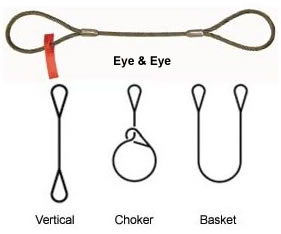 |
|
 |
|
|
|
|
|
|
|
|
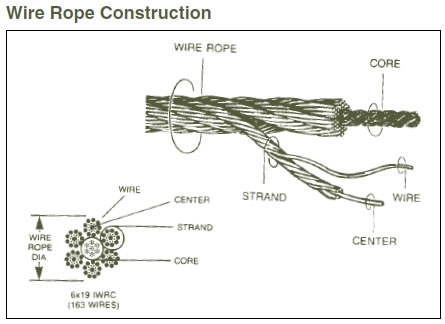 |
|
Features
and Benefits |
|
|
|
|
Maintains
all the basic wire rope sling features plus ... |
|
|
|
|
Promotes
Safety |
|
|
|
|
 Reserve strength - integrity of eyes not solely dependent Reserve strength - integrity of eyes not solely dependent
upon steel sleeves |
|
 IWRC resists crushing better
than FC ropes IWRC resists crushing better
than FC ropes |
|
|
|
|
Saves Money |
|
|
|
|
|
 When specified, thimble eyes protect wire rope from When specified, thimble eyes protect wire rope from
wear for increased life |
|
 Good abrasion resistance for longer life Good abrasion resistance for longer life |
|
|
|
 |
|
Order
Online, by Phone, or by E-Mail |
|
|
|
~ Add
items to your online shopping cart ~
Click a Price of the item you wish to purchase. |
|
|
|
|
*Contact
Us For Special Lengths* |
|
|
|
|
|
|
|
|
|
| PRICING
FOR PERMALOC EYE & EYE WIRE ROPE SLING |
| IWRC
(Independent Wire Rope Core) |
|
| Fiber
core available at reduced capacities |
 |
EIP,
IWRC |
¹Min.
Sling
Length |
Std.
Eye
Size
(in.)
W x L |
PRICE |
| Rated
Capacity (tons)* |
 |
 |
 |
 6
x 19 EIP, IWRC 6
x 19 EIP, IWRC |
| |
|
|
|
|
|
3 |
4 |
6 |
8 |
10 |
| 1/4 |
0.65 |
0.48 |
1.3 |
1' 6" |
2 x 4 |
|
|
|
|
|
| 5/16 |
1 |
0.74 |
2 |
1' 9" |
2 1/2 x 5 |
|
|
|
|
|
| 3/8 |
1.4 |
1.1 |
2.9 |
2' 0" |
3 x 6 |
|
|
|
|
|
| 7/16 |
1.9 |
1.4 |
3.9 |
2' 3" |
3 1/2 x7 |
|
|
|
|
|
| 1/2 |
2.5 |
1.9 |
5.1 |
2' 6" |
4 x 8 |
|
|
|
|
|
| 9/16 |
3.2 |
2.4 |
6.4 |
2' 9" |
4 1/2 x 9 |
|
|
|
|
|
| 5/8 |
3.9 |
2.9 |
7.8 |
3' 0" |
5 x 10 |
|
|
|
|
|
| 3/4 |
5.6 |
4.1 |
11 |
3' 6" |
6 x 12 |
|
|
|
|
|
| 7/8 |
7.6 |
5.6 |
15 |
4' 0" |
7 x 14 |
|
|
|
|
|
| 1 |
9.8 |
7.2 |
20 |
4' 6" |
8 x 16 |
|
|
|
|
|
| 1 1/8 |
12 |
9.1 |
24 |
5' 0" |
9 x 18 |
|
|
|
|
|
 6
x 37 EIP, IWRC 6
x 37 EIP, IWRC |
| 1 1/4 |
15 |
11 |
30 |
5' 6" |
10 x 20 |
|
|
|
|
|
| 1 3/8 |
18 |
13 |
36 |
6' 0" |
11 x 22 |
|
|
|
|
|
| 1 1/2 |
21 |
16 |
42 |
7' 0" |
12 x 24 |
|
|
|
|
|
| 1 3/4 |
28 |
21 |
57 |
8' 0" |
14 x 28 |
|
|
|
|
|
| 2 |
37 |
28 |
73 |
9' 0" |
16 x 32 |
|
|
|
|
|
|
| Note: Larger diameter slings available. Basket ratings are based on a minimum
D/d of 25. |
| ¹
Minimum sling length when using standard eyes. |
|
|
|
 * * |
Do
not exceed rated capacities. Sling capacity decreases as the angle from
horizontal decreases. Slings
should not be used at angles of less than 30°. Refer to Effect of Angle
chart below. |
|
|
|
|
|
| Above
rope prices are domestic, for imported rope call us. |
|
| Slings
shorter than min. lengths listed may require reduced capacity ratings and/or
eye lengths. |
|
|
|
|
|
|
|
|
|
|
| EFFECT
OF SLING ANGLE |
|
|
|
|
|
|
|
|
|
Using
slings at an angle can become deadly if that angle is not taken into
consideration when selecting the sling to
be used. The tension on each leg of the sling is increased as the angle
of lift, from horizontal, decreases. It is most
desirable for a sling to have a larger angle of lift, approaching 90°.
Lifts with angles of less than 30° from horizontal
are not recommended. If you can measure the angle of lift or the length
and height of the sling as rigged, you can
determine the properly rated sling for your lift. The Increased Tension
method provides the increased tension as a
function of the sling angle. Alternatively, the sling Reduced Capacity method
may be used to determine reduced lift
capacity for any angle. |
|
|
|
|
|
|
|
|
|
INCREASED
TENSION
Determine capacity
of sling needed |
 |
REDUCED
CAPACITY
Calculate rating of each sling
rigged at this angle |
|
|
|
|
|
| 1.
Determine the load weight (LW). |
1.
Calculate the reduction factor (RF). |
|
|
|
|
a.
Using the angle from horizontal,
read across the Angle Chart to
the corresponding number of the
Reduction Factor column. |
| 2.
Calculate the Tension Factor [TF]. |
|
|
a.
Determine the sling angle as mea-
sured from the horizontal, and the
corresponding tension factor (TF)
from the effect of angle chart. |
|
|
|
-OR- |
|
|
b.
Divide sling height* (H) by sling
length* (L). |
|
-OR- |
|
|
|
b.
Length* (L) divided by height*
(H) |
|
|
|
|
|
2.
Reduction factor (RF) x the sling’s
rated capacity for the type hitch that
will be used = sling’s reduced rating. |
|
|
|
|
|
|
|
|
|
|
|
|
3.
Determine the share of the load
applied to each sling leg (LW). |
|
|
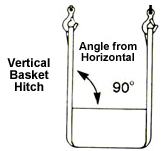 |
|
|
|
|
|
|
|
|
|
|
|
|
|
|
4.
Multiply (LW) by (TF) to determine
the sling leg tension. The capacity of
the selected sling or sling leg must
meet the calculated tension value. |
|
|
*Measured
from a common horizontal
plane to the hoisting hook. |
|
|
|
|
|
|
|
|
|
|
|
|
*Measured
from a common horizontal plane
to the hoisting hook. |
|
|
|
|
|
|
|
|
|
|
|
|
|
|
|
|
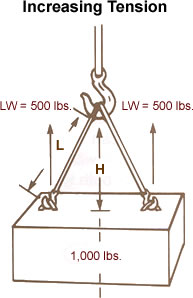 |
|
Effect
of Angle Chart |
|
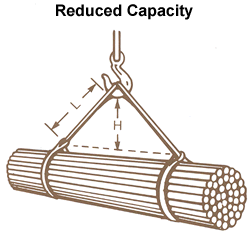 |
|
|
Tension
Factor (TF) |
Angle From
Horizontal |
Reduction
Factor (RF) |
| 1.000 |
90º |
1.000 |
| 1.004 |
85º |
0.996 |
| 1.015 |
80º |
0.985 |
| 1.035 |
75º |
0.966 |
| 1.064 |
70º |
0.940 |
| 1.104 |
65º |
0.906 |
| 1.155 |
60º |
0.866 |
| 1.221 |
55º |
0.819 |
| 1.305 |
50º |
0.766 |
| 1.414 |
45º |
0.707 |
| 1.555 |
40º |
0.643 |
| 1.742 |
35º |
0.574 |
| 2.000 |
30º |
0.500 |
|
|
|
|
|
|
|
|
|
Example: |
|
|
|
Vertical
Choker rating of each sling:
6,000 lbs.
Measured Length (L) = 6 ft.
Measured Height (H) = 4 ft.
Reduction Factor (RF) = 4 (H) ÷ 6 (L) = .667 |
|
|
|
|
| Example: |
|
|
|
Load
weight = 1,000 lbs.
Rigging - 2 slings in vertical hitch
Lifting Weight (LW) per sling = 500 lbs.
Measured Length (L) = 10 ft.
Measured Height (H) = 5 ft.
Tension Factor (TF) = 10 (L) ÷ 5 (H) = 2.0
Minimum Vertical Rated Capacity required
for this lift = 500 (LW) x 2.0 (TF) = 1000 lbs.
per sling |
|
Sling
capacity decreases as the angle
from horizontal decreases. Sling angles
of less than 30° are not recommended. |
|
|
Reduced
sling rating in this configuration
= .667 |
|
(RF)
x 6,000 lbs. = 4,000 lbs. of lifting
capacity per sling |
|
|
|
|
|
|
|
Wire Rope Slings, Wire Rope
& Slings, Lifting Slings, Lift-All, Sling, Proof Testing, Certification,
Sliding Choker,
Eye & Eye, Eye & Thimble, Eye & Hook, Thimble & Hook,
Permaloc, IWRC, 6 x 19 EIP, 6 x 37 EIP, Hooks,
and Thimbles from your source for material handling equipment. |
Back
to Product Category |
 |
|









